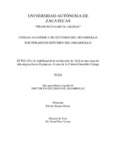
Please use this identifier to cite or link to this item:
http://ricaxcan.uaz.edu.mx/jspui/handle/20.500.11845/304| Title: | El TLCAN y la viabilidad de la producción de frijol en una zona de alta migración en Zacatecas: el caso de la Colonia González Ortega |
| Authors: | Reyes Rivas, Elivier |
| Issue Date: | 1-Dec-2007 |
| Publisher: | Universidad Autónoma de Zacatecas |
| Abstract: | La apertura comercial representa para México y en particular para el sector agropecuario un cambio de paradigma y nuevos retos para el desarrollo rural. La integración económica de la que forma parte México como nueva estrategia de desarrollo desde principios de los ochenta, promueve la apertura de las fronteras y la desregulación de la agricultura, aspectos que resultan necesarios evaluar. El presente trabajo analiza sobre qué bases podrá ser viable el cultivo de frijol de temporal en la Colonia González Ortega, Zacatecas en el marco de la apertura total que se dará en el 2008 entre México, Estados Unidos y Canadá, a pesar de ser un producto básico y estratégico para los mexicanos se decide incluirlo en las negociaciones del TLCAN. Dadas las características extensivas de producción del frijol de temporal en Zacatecas y la Colonia González Ortega en particular, es de suponer que las nuevas circunstancias económicas de integración regional y de apertura comercial agudicen aún más la situación productiva de la región y por tanto, el progresivo abandono de la actividad por los productores. La utilización del Análisis Discriminante permitió distinguir las variables que en mayor medida contribuyen en la diferenciación de los sistemas de producción. En base a los ingresos netos fue posible distinguir tres categorías de productores, los que pierden, los que se encuentran en una situación de reproducción simple (sensibles a modificaciones de las variables) y los que se encuentran con mayor holgura económica. Se determinó que los deshierbes, el uso de fertilizantes y la depreciación de equipo fueron variables con mayor incidencia en la diferenciación entre estratos. Vistas las características de producción, el tipo de productores y la problemática en la zona, así como las asimetrías de México con respecto a Estados Unidos y Canadá en términos de competitividad agrícola, existen evidencias irrefutables que hacen vulnerable la viabilidad del cultivo de frijol en la zona. Se plantean consideraciones que derivan de la evidencia empírica y el soporte teórico que pueden articular políticas públicas en virtud de la estabilidad social de este sistema producto. |
| Description: | The commercial opening represents for Mexico and in particular for the agricultural sector a paradigm change and new challenges for the rural development. The new development strategy adopted by México since the early eighties promotes the opening of the frontiers and the deregulation of the agriculture, aspects that are necessary to evaluate. This work determines the viability of producing bean storm on the Colonia Gonzalez Ortega, Zacatecas under an open economy. A total commercial opening among Mexico, Canada and United States will be able at the beginning of 2008. Spite of beans is a basic and strategic product for Mexican inhabitants this product was included in the NAFTA negotiations. Given the extensive characteristics of production of the storm bean in Zacatecas and the Colonia Gonzalez Ortega in particular, it is assuming that the new economic circumstances of regional integration and of commercial opening will make worse the productive situation of the region and therefore, the progressive abandonment of the activity for the producers. The use of the Analysis Discriminante allowed to distinguish the variables that contribute on the differentiation of the production systems. Based on the net income it was possible to distinguish three categories of producers, those that do not make money, those that are in a situation of simple reproduction (sensitive to modifications of the variables) and those that are in a good economic situation. It was determined that the removethe overgrowth, the use of fertilizers and equipment depreciation were variables that allowed the differentiation among strata. Given the production characteristics, the type of producers in the region and their problems, as well as the asymmetries of Mexico with regard to United States and Canada in terms of agricultural competitiveness, exist irrefutable evidences that make vulnerable the viability of the bean cultivation in the zone. It was proposed considerations from empiric experience and theoretical support that can articulate public policies for the stability social of this system product. |
| URI: | http://hdl.handle.net/20.500.11845/304 |
| Appears in Collections: | *Tesis*-- UA Estudios del Desarrollo |
Files in This Item:
| File | Description | Size | Format | |
|---|---|---|---|---|
| Tesis-Doctorado-Elivier.pdf | Versión presentada | 3,12 MB | Adobe PDF |  View/Open |
This item is licensed under a Creative Commons License
